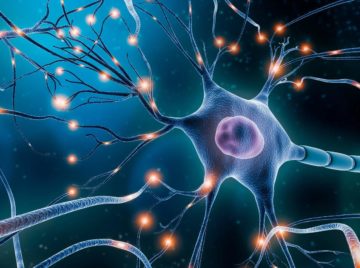Jennifer Zieba in The Scientist:
 Nerve cells, or neurons, are the basic functional units of the nervous system. Multiple interconnected neurons form a neural circuit and use electrical and chemical signals to quickly transmit information throughout an organism. The nervous system is broadly divided into two sections: the central nervous system (CNS) and the peripheral nervous system (PNS). The CNS consists of the brain and spinal cord whereas the PNS includes neurons that branch off from the CNS and connect to the rest of the body. In general, neurons in the PNS receive and carry signals in the body while neurons in the CNS analyze information.
Nerve cells, or neurons, are the basic functional units of the nervous system. Multiple interconnected neurons form a neural circuit and use electrical and chemical signals to quickly transmit information throughout an organism. The nervous system is broadly divided into two sections: the central nervous system (CNS) and the peripheral nervous system (PNS). The CNS consists of the brain and spinal cord whereas the PNS includes neurons that branch off from the CNS and connect to the rest of the body. In general, neurons in the PNS receive and carry signals in the body while neurons in the CNS analyze information.
…Typically, neurons share information by producing electrical events called action potentials, also known as nerve impulses, which involve rapid changes in voltage across their membrane. When a neuron’s dendrite or cell body receives enough inputs from other neurons via chemical or electrical synapses and a particular threshold for that neuron is exceeded, the neuron is triggered to send an action potential across its axon.
More here.
